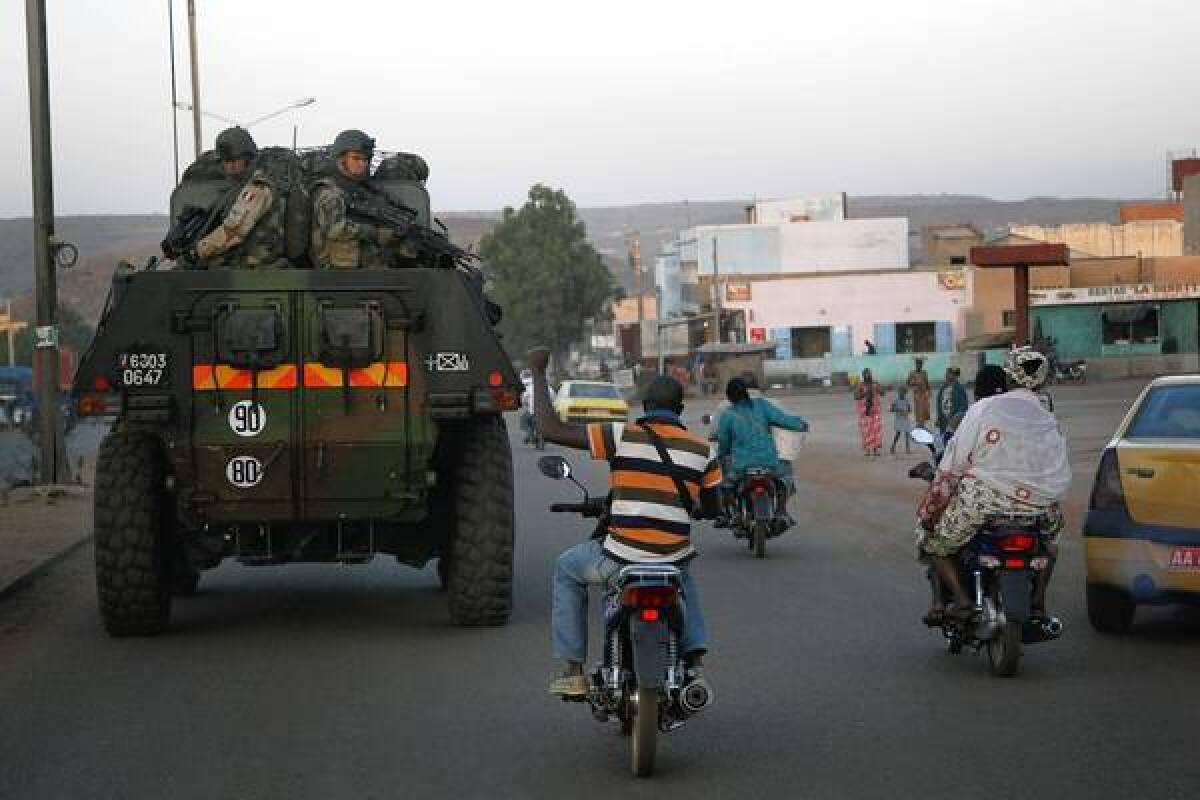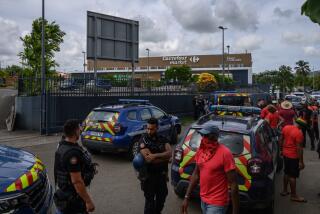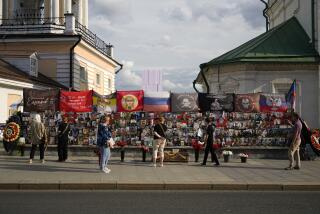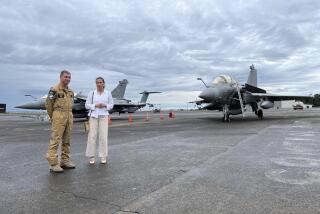France boosts military presence in Mali

JOHANNESBURG, South Africa — France boosted its troops in Mali on Tuesday as armored vehicles arrived in the capital, Bamako, as part of a planned 2,500-strong deployment to battle Al Qaeda-linked militants.
France now has about 750 troops in Mali, said President Francois Hollande, who outlined plans to more than triple the French force to help destroy Al Qaeda-linked groups in northern Mali and restore the West African nation’s territorial integrity and political stability.
“We have one goal,” Hollande said at a news conference in the United Arab Emirates. “To ensure that when we leave, when we end our intervention, Mali is safe, has legitimate authorities, an electoral process and there are no more terrorists threatening its territory.”
France, the former colonial power in Mali and other parts of West Africa, fears that Al Qaeda has been building a haven from which to unleash devastating terrorist strikes on Europe, particularly the French.
France launched airstrikes Friday and sent in special forces to support Mali’s ill-equipped and poorly trained army, after a request for help from Malian authorities battling rebel advances.
French warplanes continued to bomb rebel targets overnight and French news reports said Tuesday that Islamist fighters had abandoned the key towns of Gao and Timbuktu.
Defense chiefs representing the regional Economic Community of West African States met in Bamako to discuss plans to send in a 3,300-troop regional force, about 900 of whom are to come from Nigeria.
Hollande said French troops would remain in Mali until African forces could ensure stability.
“As soon as there is an African force, in the coming days or weeks, that is backed by the international community and by Europe, France will not have a reason to stay in Mali,” Hollande said.
Hollande said France took action to prevent the militants from seizing Bamako and controlling the entire country. He said the French operation would secure the capital, where thousands of French citizens reside, and “enable Mali to retake its territory, a mission that has been entrusted to an African force that France will support.”
A French official told the news agency Agence France-Presse that deployments from French bases in the region, including Ivory Coast, Chad and Burkina Faso, would gradually bring the troop strength to 2,500.
Mali’s crisis has its roots in the 2011 fall of Moammar Kadafi’s regime in Libya, which sent battle-hardened fighters streaming into Mali. They launched a rebellion, initially led by Tuaregs, to set up an independent state in the north.
The Malian military struggled to contain the rebellion and were angered by what it saw as the government’s failure to equip and support the army. A group led by army Capt. Amadou Sanogo toppled the government of President Amadou Toumani Toure in a coup.
Rebels took advantage of the coup to sweep across the north, seizing the towns of Kidal, Gao and Timbuktu within days. The Tuaregs were swiftly outflanked by Al Qaeda-linked militias who took control and imposed severe Islamic law, meting out floggings, amputations and stonings, banning music, smoking and alcohol, and destroying World Heritage mausoleums in Timbuktu.
The West African regional body’s forces had not expected to go into Mali until late this year, but the rebels’ thrust toward Sevare in central Mali, a town with the only major airport capable of handling large cargo planes besides Bamako, triggered a swift French intervention. Questions have been raised about how battle-ready the ECOWAS troops are as they face experienced and well-armed troops used to harsh desert combat.
Mali expert Gregory Mann of Columbia University wrote in the Africa is a Country blog that France’s intervention was necessary to turn back the rebel advance southward.
“The drama of the Islamist offensive should not be underestimated,” he wrote. “The fall of Sevare would … have made any future military operation a nightmare for West African or other friendly forces, and it would have chased tens of thousands of civilians from their homes.”
U.S. Defense Secretary Leon E. Panetta told reporters in Lisbon that the Obama administration did not plan to put troops on the ground in Mali and that the U.S. continued to work on what type of assistance it would provide France. U.S. officials said Monday that they were preparing to ferry additional French troops to Mali and making plans to send drones or other surveillance aircraft and help with the refueling of French fighter jets.
Special correspondent Kim Willsher in Paris contributed to this report.
More to Read
Sign up for Essential California
The most important California stories and recommendations in your inbox every morning.
You may occasionally receive promotional content from the Los Angeles Times.










